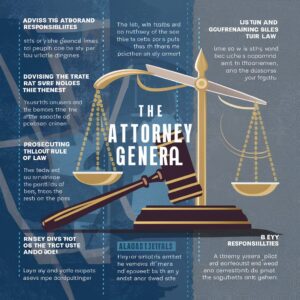
In every governmental structure, the role of the Attorney General stands as a cornerstone of legal authority and public trust. This position holds immense responsibility in upholding the rule of law, protecting the rights of citizens, and ensuring justice is served across various domains of governance.
What is the Attorney General?
The Attorney General (AG) is the chief legal officer of a government, typically at the federal or state level. This distinguished position is pivotal in overseeing legal affairs, advising government officials, and representing the state’s or nation’s interests in legal matters.
Key Responsibilities of the Attorney General:
1. Legal Advisor to the Government:
One of the primary roles of the Attorney General is to provide legal counsel and guidance to government agencies, departments, and officials. This includes interpreting laws, issuing legal opinions, and ensuring that governmental actions comply with constitutional principles and statutory requirements.
2. Chief Prosecutor:
In many jurisdictions, the Attorney General serves as the chief prosecutor, overseeing criminal prosecutions and representing the government in high-profile cases. They work closely with law enforcement agencies to uphold public safety, prosecute criminal offenses, and seek justice for victims of crime.
3. Defender of Constitutional Rights:
As a guardian of constitutional rights and civil liberties, the Attorney General plays a crucial role in protecting the rights of individuals and communities. They may intervene in cases involving civil rights violations, discrimination, and other matters affecting public interest.
4. Legal Advocacy and Litigation:
The Attorney General’s office engages in litigation on behalf of the government, defending state or national interests in courts of law. This includes challenging or defending laws, regulations, and policies that impact the public welfare and governmental authority.
5. Consumer Protection and Regulatory Oversight:
Many Attorneys General oversee consumer protection efforts and regulatory enforcement. They investigate fraudulent practices, deceptive advertising, and violations of consumer rights, taking legal action against individuals or businesses engaged in unlawful practices.
6. Upholding Rule of Law and Public Trust:
Beyond specific duties, the Attorney General upholds the rule of law by ensuring fair administration of justice, promoting transparency in governmental actions, and fostering public trust in legal institutions. They play a critical role in maintaining the integrity of democratic processes and safeguarding the principles of justice and equality.
Importance of the Attorney General:
The Attorney General occupies a position of immense importance in the legal and governmental framework. Their actions and decisions impact public policy, legal precedent, and the protection of fundamental rights. Key reasons why the role of the Attorney General is crucial include:
1. Safeguarding Justice and Fairness:
By enforcing laws impartially and advocating for equitable outcomes, the Attorney General promotes justice and fairness within society.
2. Legal Expertise and Leadership:
Attorneys General bring legal expertise and leadership to governmental decision-making, ensuring that legal considerations are integrated into policy development and implementation.
3. Public Accountability and Transparency:
Through their oversight and advocacy, Attorneys General contribute to governmental accountability and transparency, fostering public confidence in the rule of law and democratic governance.
4. Protecting Vulnerable Populations:
Attorneys General often champion causes that protect vulnerable populations, such as victims of crime, children, seniors, and individuals facing discrimination or injustic

5. Promoting Legal Reform and Innovation:
Attorneys General drive legal reform efforts and innovative approaches to address emerging legal challenges, such as cybersecurity, environmental protection, and technological advancements.
Conclusion
In conclusion, the Attorney General embodies the principles of justice, integrity, and legal stewardship within the government. Through their multifaceted roles as legal advisor, chief prosecutor, and guardian of rights, Attorneys General uphold the rule of law, protect public interests, and ensure that justice is accessible to all. Their contributions are essential to maintaining a just and orderly society where the rights and freedoms of individuals are safeguarded under the law.
Whether at the federal, state, or international level, the Attorney General’s office remains a pillar of legal authority and public service, dedicated to serving the interests of the people and upholding the foundations of democratic governance.



